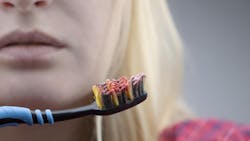Dear Patient: Your unhealthy mouth could kill you
My husband learned recently that his 50-year-old coworker died of a heart attack. I haven’t met this person and know very little about him, but after the initial shock, my first thought was to wonder about his oral health. Could that have played a part in cutting his life short?
I did allude to the rare but real possibility of dying from untreated decay in “Why that little cavity is a big deal.” It may sound dramatic, but your mouth plays a huge part in your overall wellness. The biofilm that lives in your mouth can promote health—or contribute to disease. When I tell this to people, they usually say, “Well, I go to the dentist, and they say I’m healthy.” And while I am grateful they have a dental home, I wonder if their dental team is doing all they can do to promote health.
Gums should not bleed. Period
For a very long time in my career as a dental hygienist, I thought bleeding was no big deal. After all, almost all the patients I saw bled as I cleaned their teeth. I accepted that some people’s gums always bleed, not knowing what else to do outside of the normal scrape and polish. I’m guilty of downplaying patients’ conditions, not wanting to make them mad or sound like a nag—or worse, compelling them to do only what their insurance would cover without even offering them more comprehensive care.
Now I know how wrong I was. The science is solid, and it shows us that the health of the mouth directly impacts the health of the rest of the body and vice versa. All those patients whose gums always bled most likely had some other underlying condition. Perhaps it was early diabetes, kidney disease, or even certain cancers. I have a few patients who stick in my mind who I’d love to find and figure out the root cause of their bleeding gums and bring them to health with all I know now.
What I ask for—and what you should demand
When I’m in the hygiene chair for my preventive visit, I want to know if there’s even a drop of blood. I ask my hygienist to stain the plaque on my teeth with disclosing solution so I can see where I’m missing and ask for tips on how to do better. Your checkup should not be a chat and polish where you find out what your hygienist’s kids are up to. Insist on a visit that looks into your overall health and offers treatment options that have nothing to do with your insurance coverage, and leave with at least one thing you can do better at home. For example, get an electric toothbrush and use it daily for a full two minutes. Start using interdental picks after you eat (and even when you're just sitting around). Once you've graduated from some of those basics, talk to your dental team about diving into salivary diagnostics, pH testing, looking at your plaque under a microscope, or even looping in your physician.
Your health, and life, might depend on it.
About the Author

Amanda Hill, BSDH, RDH, CDIPC
Amanda Hill, BSDH, RDH, CDIPC, is an enthusiastic speaker, innovative consultant, and award-winning author who brings over 25 years of clinical dental hygiene and education to dentistry. Recipient of OSAP’s Emerging Infection Control Leader award and an active participant with the advisory board for RDH magazine, DentistryIQ, and OSAP’s Infection Control in Practice Editorial Review Board and membership committee, Amanda (also known as the Waterline Warrior) strives to make topics in dentistry accurate, accessible, and fun. She can be reached at [email protected].
